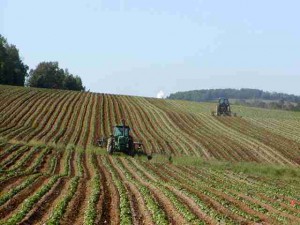Bigger, Not Better
Large Farms Are the Emperors of Rural America
by Evaggelos Vallianatos
Large farmers, with farms thousands of acres in size, have tremendous power.
 You can visualize that power standing on the border of any such large farm. You see nothing but the horizon in the far distance touching the flat land. Coming as I did from Greek culture where farms are tiny, each bordering the neighboring farm with beautiful small stone walls or trees, the vast expanse of merely land without any fences or houses or trees, is always shocking. But after my bewilderment wears thin, I realize these monstrous farms produce most of America’s food.
You can visualize that power standing on the border of any such large farm. You see nothing but the horizon in the far distance touching the flat land. Coming as I did from Greek culture where farms are tiny, each bordering the neighboring farm with beautiful small stone walls or trees, the vast expanse of merely land without any fences or houses or trees, is always shocking. But after my bewilderment wears thin, I realize these monstrous farms produce most of America’s food.
Large farmers are the emperors of rural America. The federal government lavishes more than $20 billion of subsidies on them every year. Other long-term subsidies in water, science and technology are worth trillions.
The U.S. Department of Agriculture has hundreds of scientists and dozens of laboratories devoted to serving large farmers. The country’s 65 public agricultural universities do the bidding of large farmers.
Land grant universities invented and developed pesticides and the machinery of agribusiness. They provide the numerous entomologists, crop disease specialists, soil scientists, agronomists and other experts monitoring the extremely vulnerable system of the one-crop plantations dominating the farming of America. The same agricultural scientists invented and started the genetic engineering of crops, now the rage of corporations like Monsanto.
In 2003-2004, I was a visiting professor at the University of Maryland, which is a land grant university. I was teaching environmental politics in a department known as “Natural Resource Sciences.” My colleagues were agronomists, soil scientists, biologists, and water experts.
Yet, with the exception of a soils professor, most of my colleagues did not even use words like sustainable or organic or family farming. They only studied and taught agribusiness. Large farmers were their models. This blinded them to the real threat of water contamination by chicken factories in Maryland. Chicken pollution is killing the Chesapeake Bay, the natural treasure of Maryland. However, the agricultural scientists of the University of Maryland remain silent. They prefer the high-stakes political game and money of agribusiness to a healthy environment and a flourishing family farming economy and society.
The subversion of the country’s agricultural universities by agribusiness is bad for science and public health.
Agribusiness that develops genetically engineered crops at agricultural universities muzzles the scientists of those universities. In 2008, 26 scientists from Midwestern universities sent a statement to the U.S. Environmental Protection Agency in which they said the “technology agreements” their universities signed with the biotechnology companies “prohibit research … inhibit public scientists from pursuing their mandated role on behalf of the public good.”
Fast food chains have a niche in the student cafeteria of the University of Maryland, another failing grade for a university built for the public good.
Maryland is a small state that could easily have been an example of good food, family farming, and environmental protection for the rest of the country. In 2012, Maryland has 12,800 farms whose average size, according to the Maryland Department of Agriculture, is 160 acres.
Only 90 of these farms are organic, which means the food they raise is wholesome; it is raised without synthetic pesticides and fertilizers and it is free of genetic engineering.
Large farmers are large businesses. They suck the life out of small towns. They buy their feed and tools and machinery from big manufacturers; they borrow money from large banks; and there are few of them in control of most of the available land. Their actions all but kill small business and local taxes.
When a rural town is in the midst of large farms, it becomes like a transient camp, its public services fade away, and small business and middle class die. Democratic life declines. The only jobs left in the town are jobs serving agribusiness. Small farmers are forced to abandon farming.
In 1990, Linda Lobao of Ohio State University published the results of her sociological study on the effects of industrialized farming on rural communities. Her data came from 3,000 U.S. counties. She found decay in communities depended on large farms.
In 2006, Curtis Stofferahn of the University of North Dakota updated the work of Lobao. In summarizing the findings from 50 years of social science research, he reached the following conclusions: Industrialized agriculture “disrupts the social fabric of communities … poses environmental threats where livestock production is concentrated; and is likely to create a new pattern of ‘haves and have nots.'”
In other words, Lobao and Stofferahn confirmed the fear of the 1884 California State Agricultural Society: that large farms are bad for society and democracy.
Evaggelos Vallianatos, former EPA analyst, is the author of several books, including “Poison Spring†(forthcoming, Bloomsbury Press).
